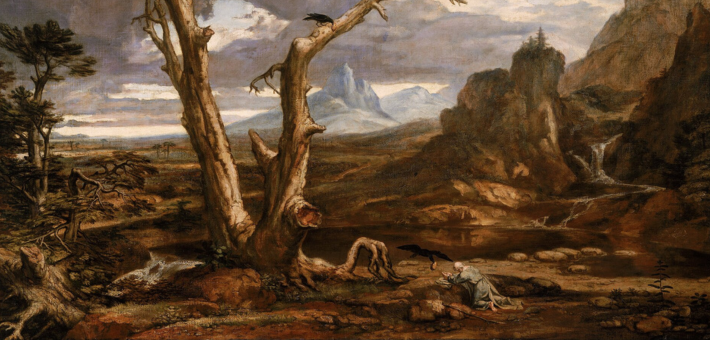Commentary on 1 Kings 19:1-18
This is a story of pain, lament, and reframing. Here, Elijah the prophet descends from his triumph on one mountain, Carmel, and climbs another, Horeb. On the first mountain, he found vindication in the form of fire from the sky. On the second, he will receive a renewed commission. There, he also experiences phenomena reminiscent of the life of Moses, but bespoke and tailored for him and his new era.
This is the story read following the grain of the text, and its careful construction deserves a close reading. Yet, entangled with this story is another, read against the grain of the text. Elijah both experiences violence and deals it out. Like some of the early medieval figures who “Christianized” northern Europe, Elijah fiercely eliminated the prophets whose views of the divine realm differed strongly from his. They could count on royal support in their lifetimes, and royal revenge afterward. The contemporary reader and preacher must weigh this counter-story too.
But the first story first. The carefully constructed tale begins with a royal threat, an oath suitably resting on the bona fides of “the gods.” Jezebel’s appeal to them identifies the queen as a polytheist, someone hostile to Israel’s core story of communion with YHWH, the God of the exodus and the ancestors (verses 1–2).
Next, Elijah runs for his life, first to the town on Judah’s southern border, Beer-sheba, and then a day’s journey further into the desert (verses 3–8). Again, space matters. The prophet leaves the zone under direct control of the Omride dynasty, going first to the territory of Judah and then into a sort of nobody’s land, where political power rests in the hands of local chiefs leading small bands. This new space becomes a place of revelation through miraculous feeding, as had occurred for Elijah before (1 Kings 17:1–7). Here, a divine messenger (or angel) encourages him to eat and drink as preparation for the long journey ahead. Such an event, though well outside the experience of most readers ancient or modern, surprises neither Elijah nor the readers of his story. The wonder-working prophet inhabits a world apart.
He also prays in the desert (verse 4). His troubled, self-immolating words request extinction at the hands of YHWH, as Elijah’s despair comes to the fore. Still, his argument for death, “I am no better than my ancestors,” seems odd. Assuming that life and death remain under the control of Israel’s God, the prophet opts for death, which will at least allow him rest and perhaps deprive Jezebel and her minions of the satisfaction of killing him. In death, too, he will find a place of belonging, with his ancestors rather than the current generation of idolaters.
The angel denies his request, however. “No, you must go to Horeb.” In a 40-day trip reminiscent of Moses’ 40-day sojourn on the mountain, he goes.
The third phase of the story (verses 9–15) takes place at the “mountain of God,” the old holy site where Israel became a nation by entering into covenant with YHWH and receiving the Torah. This story places prophecy on a parallel with the Law of Moses, but it does more than that. It explores a prophetic stance toward Israel’s God, allowing the conversation between YHWH and Elijah to mirror the relationship between deity and people more generally.
The conversation with YHWH occurs twice on almost the same terms, with the first iteration setting up the second.
“What are you doing here, Elijah?” asks YHWH.
Then the prophet’s carefully rehearsed speech: “I have been very zealous, but the people have destroyed your altars and killed your prophets. I’m by myself.” Like lamenters in the Psalms, Elijah establishes himself as a righteous person deserving a hearing. (Sinners must pray a penitential psalm, while righteous people can lament and petition.) Also like lamenters in the Psalms, he points to other people who have brought pain upon him in some way. He names the moral hazards he faces—in this case, the persecution of the true faith and its defenders.
This exchange happens twice, obviously because the storyteller thought the repetition important. Yet, why does YHWH ask Elijah’s reasons for coming? The question does not scold Elijah as though he had no right to come to Horeb. Nor does it invite Elijah to reconsider his decision, or if that were the intention, it fails because Elijah repeats his reasons verbatim. Instead, YHWH’s question invites Elijah to state his case and demand a hearing.
In relating Elijah’s lament, the story also recounts roads not taken, all the traditional accoutrements of theophany derived from the Moses story—hurricane, earthquake, and fire. Such fearsome manifestations of divine presence do not fit the crisis at hand, in which a broken man seeks assurance of divine help. So, the conversation repeats itself in near silence.
In that stillness, Elijah finds God.
YHWH’s answer (verses 15–18) first commissions the prophet to engage in geopolitics for the world after the fall of the Omride dynasty. Elijah must designate future leaders. Then YHWH reassures him that, whatever happens, he will not be alone in his devotion, for a sufficient number (here 7,000) still have neither “bowed to Baal nor kissed him.” Perhaps the sequence of the answer’s components matters: Elijah’s mind will be reordered after he has acted. Action and thought intertwine in complex ways.
So far, the story reads with the text’s grain. What about the counter-story of violence? The stories of prophets in 1–2 Kings all sound overtones of royal persecution or at least threats against those speaking for God. The appeal for justice and true respect for God always provokes resistance from centers of power. Elijah’s violent response to his success at Carmel has few parallels in stories about the prophets, indicating discomfort with the strategy, even in settings where the state poses threats to the covenant with YHWH. Still, the counter-story humanizes Elijah, reminding readers of his limits. His attempts to overpower YHWH’s enemies fail because only truth and morality can prevail in the world of the spirit.
PRAYER OF THE DAY
Powerful God,
Although you can make your presence known in a mighty wind, or an earthquake, or a fire, you often speak to us in the sound of sheer silence. Help us to hear. Amen.
HYMNS
For all the saints ELW 422, H82 287, UMH 711, NCH 299
I sing a song of the saints of God H82 293, UMH 712, NCH 295
Now the silence ELW 460
CHORAL
Holy is the true light, William Harris
Give us the wings of faith, Ernest Bullock


November 2, 2025